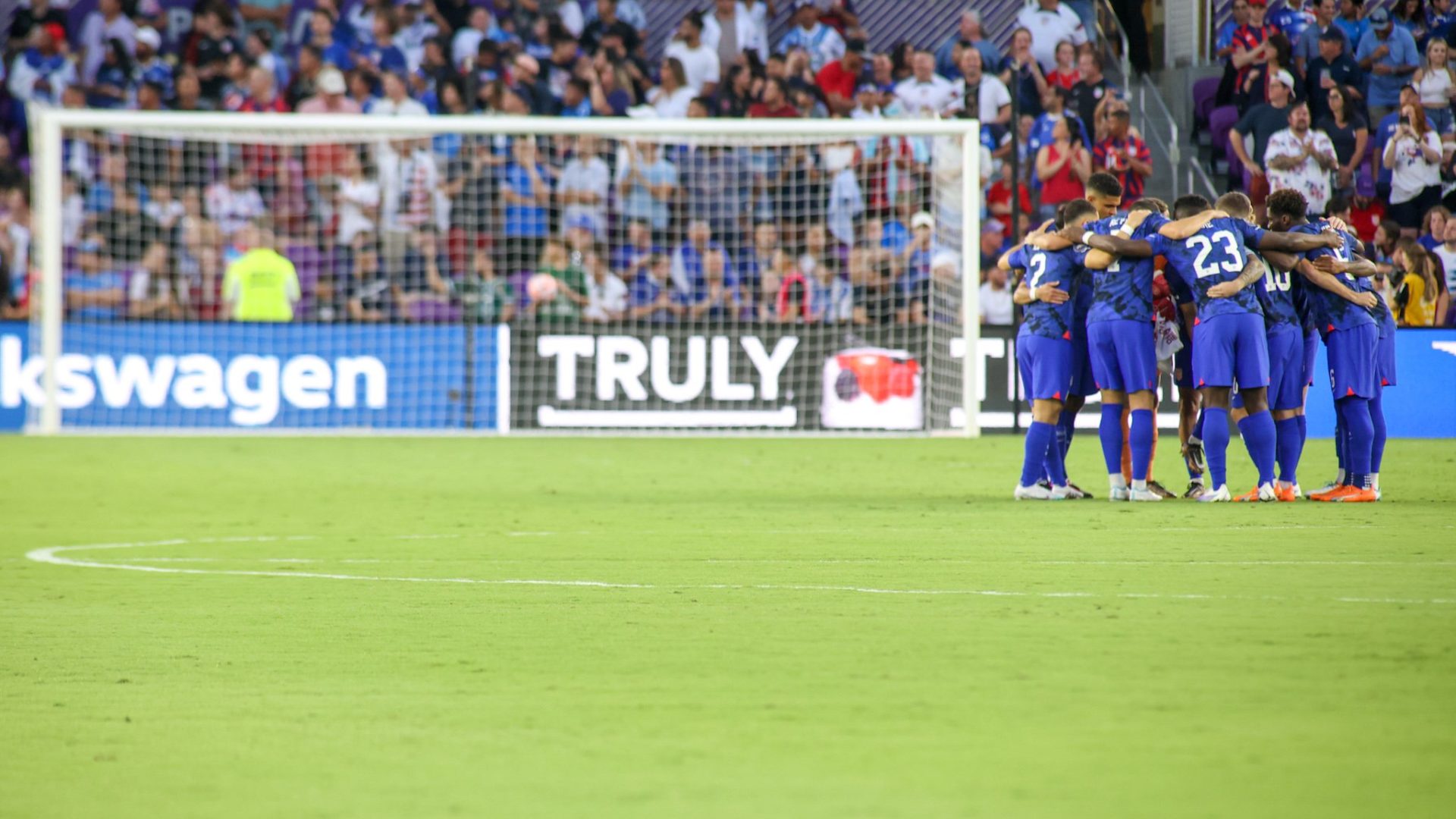By Will Brown
A year from now the United States will host the world when the men’s World Cup kicks returns.
The preparation on these shores for the 48-team tournament has caused consternation and dismay because the United States men’s national team has not played well.
It has led to those who truly know soccer to question whether the Americans will be embarrassed next summer in front of a few billion eyes. It has led others who think they know the game to do the same.
That is how former U.S. men’s national team defender Alexi Lalas came to lament the diversity of thought in this country about what constitutes beautiful soccer.
Lalas earns his paycheck from Fox Sports. He appeared on Fox Sports 1 in Miami earlier this week for a 12-minute segment about soccer.
That was where he opined this country’s men’s soccer team should become more exclusive because “this melting pot fallacy” has not helped the red, white and blue of the Western world win matches at a men’s soccer tournament.
We focus on the men for this essay, because even at their worst, the U.S. women’s soccer team was millimeters away from advancing to the quarterfinals. The men can only pray to have a fraction of the success of the U.S. women in a major tournament.
“We oftentimes talk about our diversity and we talk about it in the fact that it is one of the advantages we have, and of the great things about our country,” Lalas said on First Things First. “But with that diversity comes diversity of thought. If I go and ask a hundred soccer people out there, ‘What’s beautiful soccer?’ I’m going to get a hundred different answers. And it might be based on ethnicity, where you grew up, even geography. All of these different things.
“So I’ve argued that the homogenous nature of some other countries and cultures just in population in terms of size are much more manageable. And there is a collective understanding and, more importantly, an agreement in this is how we’re going to play. But getting 11 men to represent this great country of 350 million people, and all be on the same page, that is very, very difficult.”
Lalas suggested the United States develop a pragmatic style of play that can be implemented at a short tournament like a men’s World Cup.
There is no perfect way to play the beautiful game.
African champions, Côte d’Ivoire, fired their coach en route to winning the Africa Cup of Nations in 2023; Spain relied on a teenager to win the Euros last summer; meanwhile, two-time Asian champions Qatar have nationalized more players than almost any other competitive nation. Meanwhile, the U.S. men’ won its most recent Gold Cup with an attacking trident that featured a trio of Californians – one of which was Black, another who was white and the team’s captain that night who was of Mexican heritage.
It’s true, there are countries that have an ethos.
The world champions, Argentina, have prided themselves on fielding players who are a blend of grit and creativity who refuse to back down in any circumstance.
Brazil had a reputation for flair, effervescence in victory.
Japan has small, technical players who execute short passes until a gap opens up that they can exploit.
The best Dutch teams were known for their fluidity, movement and unpredictability.
Then there are countries that try to win by any means necessary.
England expects its starting XI to win. Whether they are Black or white; Anglican or Muslim; naturalized or homegrown, the expectation is the Three Lions win. They often don’t – the game’s founders haven’t won anything since the 1966 World Cup – but, the expectations are astronomical.
Then there is France, a country whose greatest soccer triumph was achieved via “Black, Blanc, Beur.” The French team that won the 1998 men’s World Cup in Paris had a starting XI that featured Black players from Caribbean dominions, Black players from mainland France, white players from France’s Basque region as well as a certain No. 10 of Algerian descent.
Soccer is the global game. Lalas knows this.
The most successful men’s national teams over the last 30 years have not been successful because they are culturally homogenous. They have been triumphant because they have 11 highly skilled players on the field who would give their left lung for their country.
Oftentimes, there was at least one player who was a naturalized citizen. Argentina is an exception. Argentina was one of three teams, out of 32, at the 2022 men’s World Cup that did not have a naturalized citizen on its roster. Then again, Argentina also has Lionel Messi.
It may be easy to dismiss a diversity discussion in men’s soccer while entire regions of the world are on edge.
The truth is, geopolitics have always lurked beneath the surface of men’s soccer.
It’s why Israel plays its competitive matches in the European confederation, despite being located in the Middle East. It’s why Qatar and Russia have hosted the last two men’s world championships. It’s also why the African Cup of Nations has been moved multiple times throughout its history.
Dictators like Benito Mussolini and the Argentine junta that once controlled the country have used the success of their men’s soccer team to prop up their regime.
The reason soccer is the global game is because of British imperialism. Brian Glanville wrote a fantastic book on the globalization of the sport from England, to Scotland, then beyond in the late 19th century.
Men’s soccer has also stopped civil wars and served as a cultural exchange.
The U.S. men’s soccer team is currently coached by an Argentine. It’s also been managed by a German and a Serbian in recent decades. The latter ensured the United States men’s national team did not embarrass itself the last time it hosted the men’s World Cup in 1994. Lalas was on that team.
The 1994 U.S. men’s soccer team featured naturalized citizens from Germany, South Africa, El Salvador, Uruguay and the Netherlands.
There were also multiple players from New Jersey, Black and white players from Southern California and squad members from middle America who rounded out a squad that surprised everyone to advance to the knockout rounds.
They didn’t play pretty soccer. But, they found a way to get results.
With a year before the world returns to these shores, hope that the United States men can get results continues to wane.
U.S. Soccer hired Mauricio Pochettino to serve as head coach after the Americans lost to Panama and Uruguay in last year’s Copa America. Since his appointment, Pochettino has yet to have the complete player pool available for selection.
A country with 2.5 million registered youth soccer players should not struggle to find 11 men who can pass, run, compete and put the ball in the back of the net. Yet, here we are.

Amid an era where “diversity”, “equity” and “inclusion” have become synonymous with expletives in the view of some in these conjoined states, Lalas brought the culture wars to a sport that has lacked an identity in this country.
Diversity has been a strength of the U.S. men’s national team since it started qualifying for the men’s World Cup on a consistent basis in 1990.
Currently, the best XI for the U.S. men’s national team features the son of a former Liberian president; the son of a former college basketball who grew up in Alabama suburb.; a child from a working-class family in a small city in upstate New York as well as a naturalized citizen grew up in England.
And those are just the Black players.
The current U.S. men’s national team also has Latino and white players. It has naturalized citizens and children of immigrants.
The squad representing these bifurcated states in the Gold Cup – the continental championship for North and Central America – has tasked the goalscoring to the child of Ghanaian immigrants; the goalkeeping to a Harvard graduate and deployed men of Mexican, Spanish and Brazilian heritage to patrol the midfield.
There are genuine questions that have been asked, and must be answered, about how the United States can develop its men’s national team. There are also questions about how this country can maintain its pipeline of all-conquering women’s players as well.
Talented players in the United States are too frequently priced out of participation in the game. But, on any given Saturday at a park near you, there will be some young child kicking a ball.
They may be Christian, Muslim, Jewish, the child of agnostics; Black, Asian, Latino or white. If nurtured, they could become the next great American soccer player.
Will Brown is the Founder and Editor of OfficialFloridaFC.com. He has served as a journalist in Florida and Texas for nearly 20 years.



